Removable dentures, also known as removable prosthetic teeth, are a preferred method of restoring teeth because they do not require strict oral conditions or surgery. So, how does the process of making removable dentures take place? Is it safe? BeDental will help answer these questions through the following article!
What are removable dentures?
Removable dentures, also known as removable prosthetic teeth, are a method of restoring teeth for patients who have lost teeth and cannot be restored using other methods or want to minimize costs.
The process of making removable dentures is usually used for elderly patients who have lost teeth and have difficulty restoring them. Other methods of restoring teeth require ensuring oral health and the absence of cardiovascular diseases, high blood pressure, etc., before proceeding with dental restoration surgery.
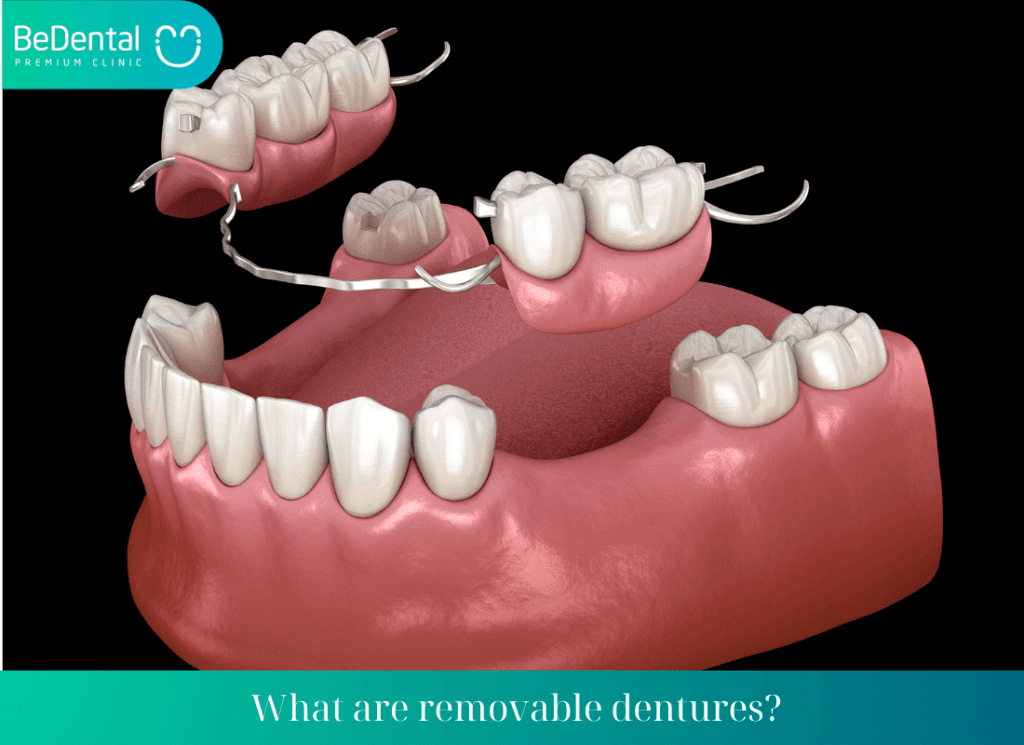
However, the method of removable dentures does not require ensuring health conditions, making it an optimal method for elderly people who have lost some or all of their teeth.
Classification of removable dentures.
Removable dentures consist of two parts: the denture framework and the denture base. Depending on the material used, there are different types of removable dentures:
See more: 3 ways to maintain removable dentures
Based on the condition of the denture, removable dentures are divided into two types: partial dentures and complete dentures.
Partial dentures include:
- Plastic dentures: The process of making plastic removable dentures is relatively simple and cost-effective. However, after prolonged use, it can cause bad breath, discomfort, and gum pain.
- Metal dentures: These removable dentures have a metal framework made of Ni-Cr or Titanium, and the teeth are attached to the metal framework, making them more stable than plastic dentures.
- Attachment dentures: This type of denture features a connected framework that is attached to natural teeth using connectors, making the denture more stable. The process of making attachment dentures is more complex and expensive than the usual removable denture process, but the quality is better.
- Soft plastic dentures: The process of making soft plastic removable dentures is similar to that of plastic dentures but more complex. Due to the soft material, it is slightly more expensive than regular plastic materials.
- After a period of use, it may absorb mouth fluids and cause bad breath, and the plastic base tends to harden and cause gum pain when chewing.
Complete dentures also have various types similar to partial dentures; however, the process of making complete dentures is more complex and challenging than partial dentures.
The process of making removable dentures.
To have removable dentures, it is necessary to go through 10 steps of denture fabrication. Each step involves taking dental impressions and the sculpting process by the dental technician.
Step 1: Pouring models
Dentists will take preliminary impressions of your teeth using modern technologies. They will place an impression tray into your mouth and let the plaster dry for about 5 to 7 minutes. Then, they will mix more plaster and pour it into the impression tray to complete the dental impression process.
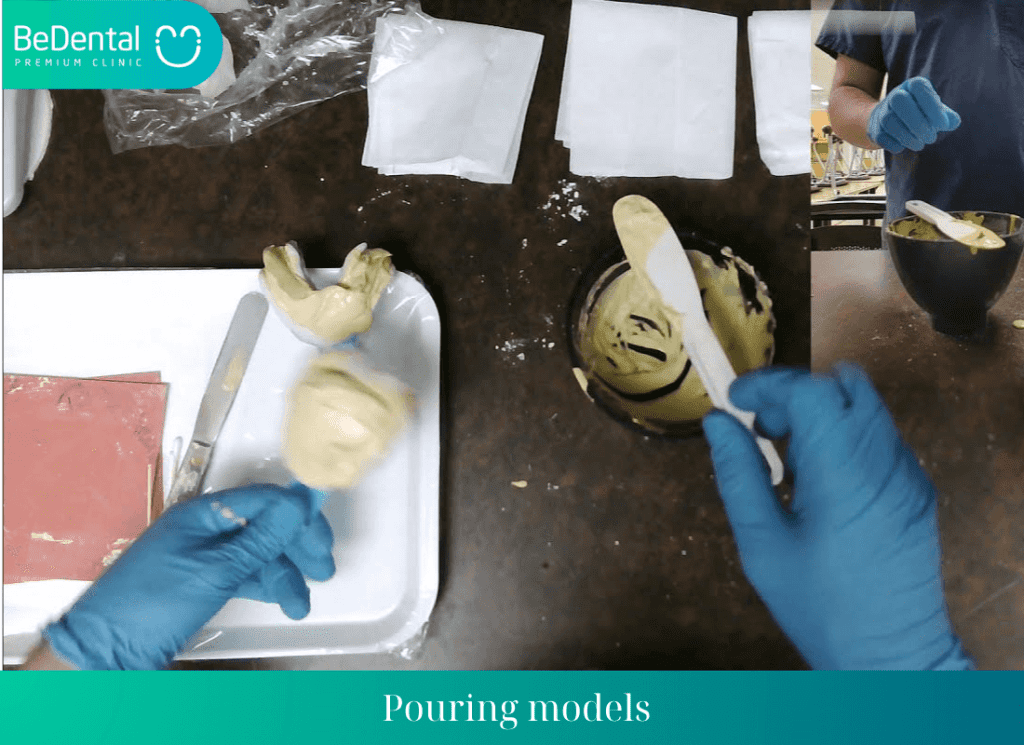
Step 2: Fabricating the framework and bite rims
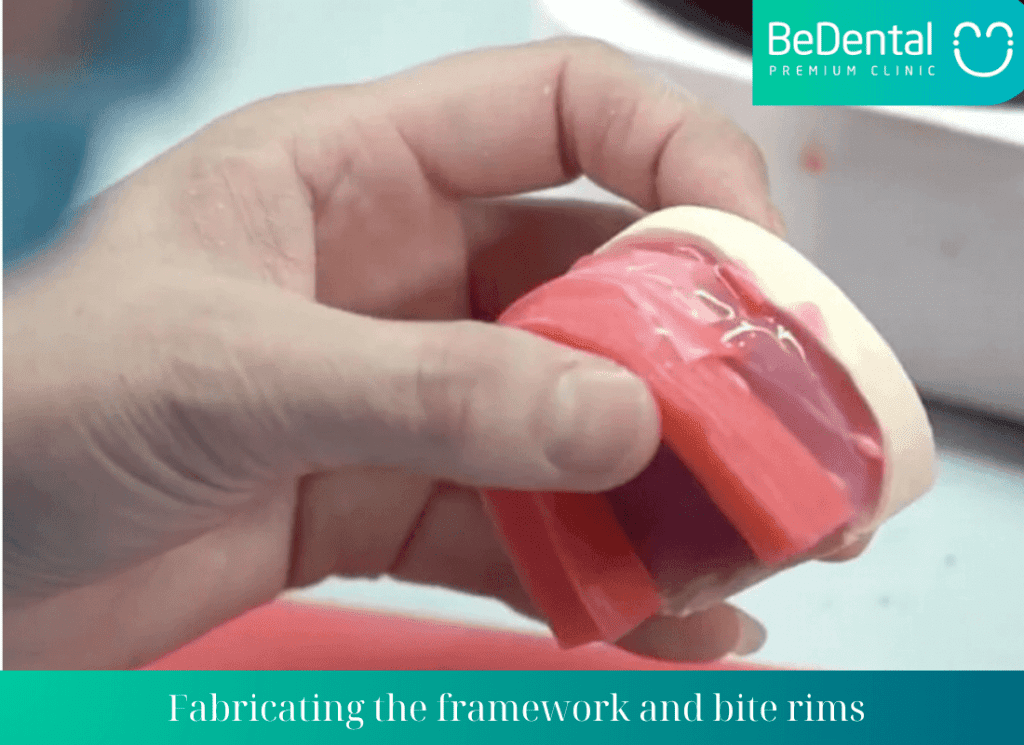
Step 3: Articulating the models
The main denture bases, created from the custom impression trays and measurements of the wax bite rims, are articulated using an articulator to represent the relationship between the patient’s jaws.
See more: Dentures fall out
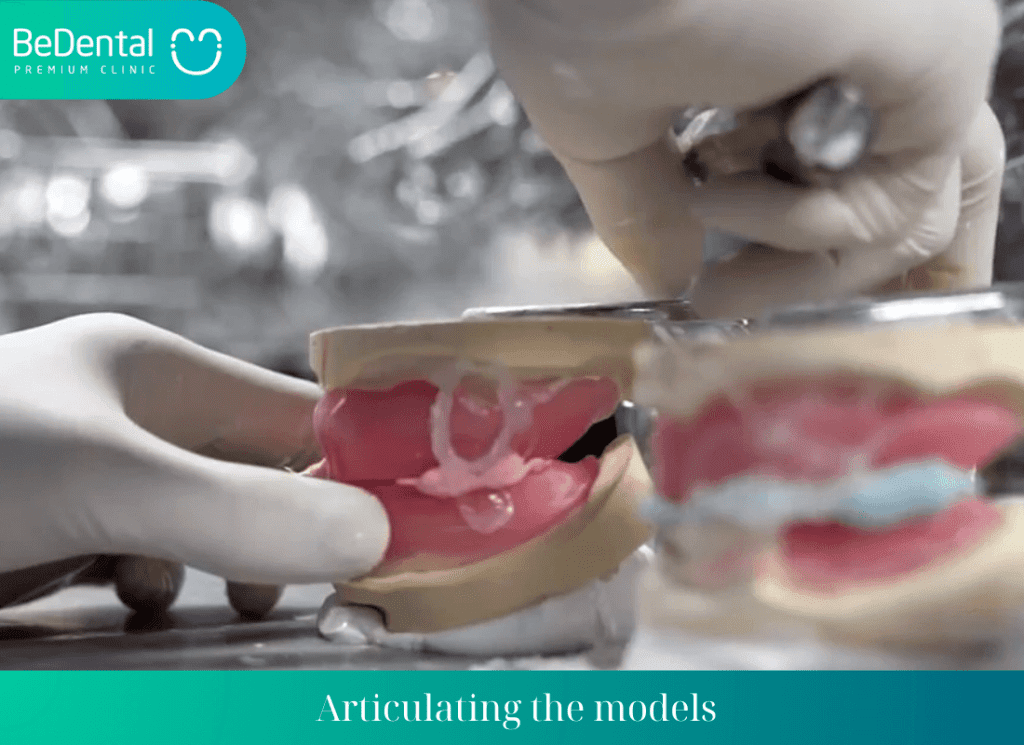
Step 4: Setting the teeth
Your laboratory technician will set the teeth according to the desired bite scheme. Ensuring proper form and function.
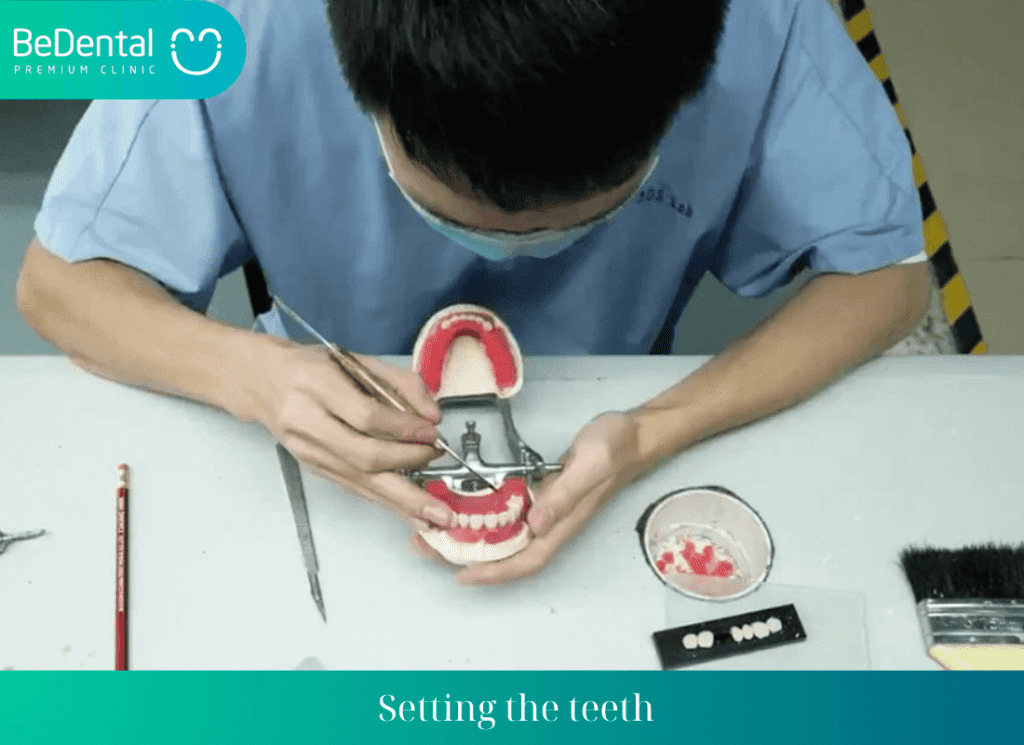
Step 5: Constructing the denture model
Once all the teeth have been accurately set, the technician will add wax around the teeth, gradually building up the precise gum contour. The appropriate amount of wax is added to provide proper facial support and create a natural appearance.
The wax can be manipulated gently to ensure that after the denture is completed, the acrylic gum portion does not look unusually smooth or shiny.
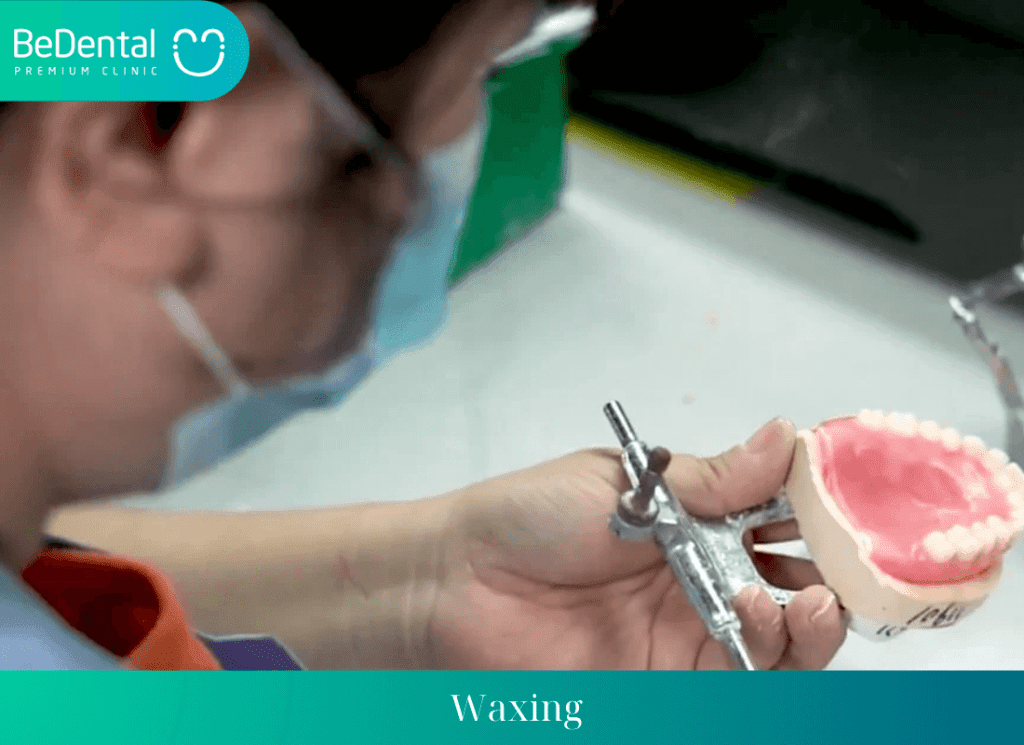
Step 6: Flasking
Once the dentist and patient have approved the denture try-in, the denture is ready to be processed. The first step is to create a denture flask by placing the model with the denture teeth into a bottom flask secured with plaster. Once the plaster is dry, the top flask is positioned and additional plaster is poured in.
Next, the flask is heated until the wax is completely melted. The flask is then opened, and the wax is completely eliminated, leaving behind the teeth and denture mold filled with acrylic.
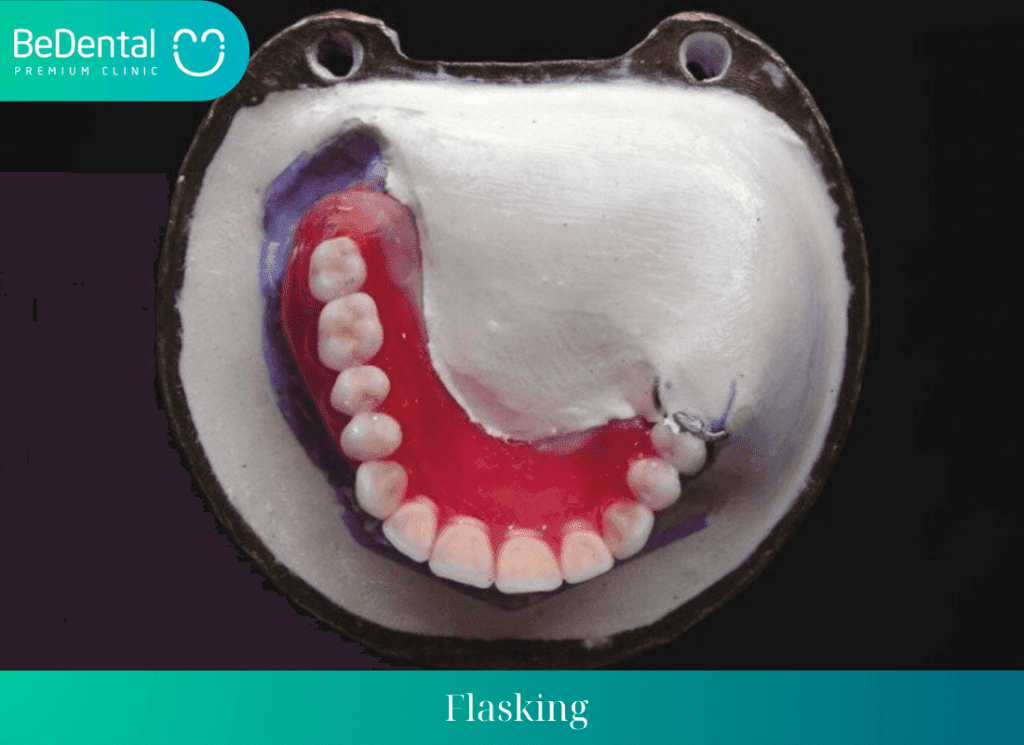
Step 7: Mixing acrylic
The technician accurately weighs the monomer and polymer. They carefully mix them together to form acrylic.
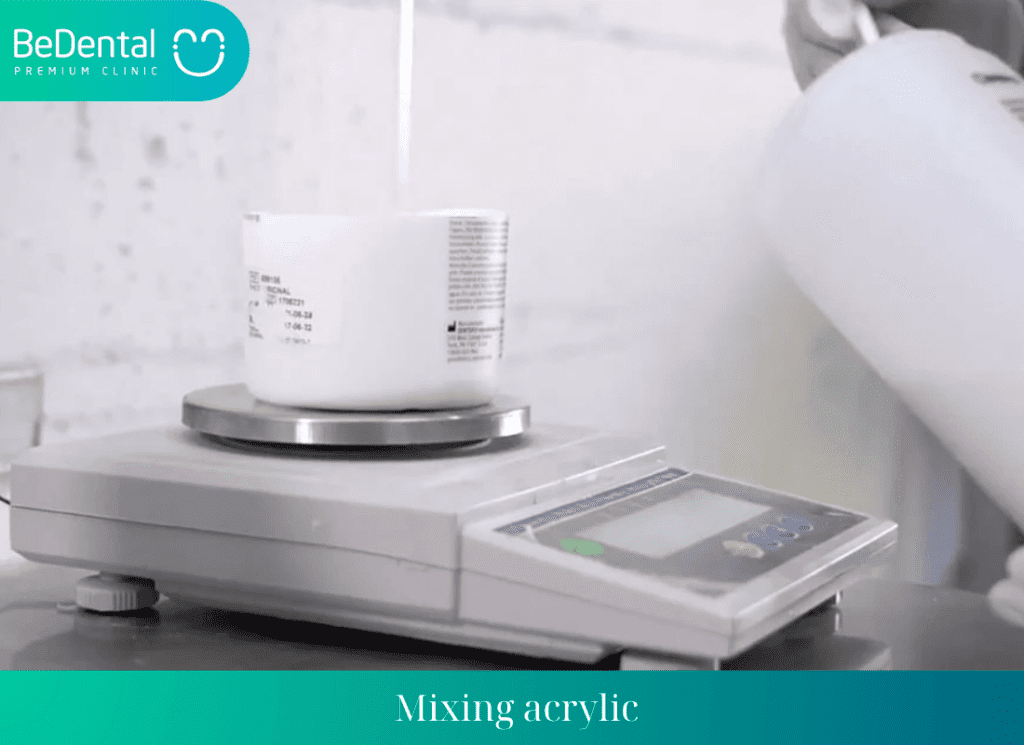
Step 8: Acrylic compression
After preparing the mold, the acrylic is packed into the flask and the two halves of the mold are placed back together. The denture is then maintained under pressure until it reaches the desired hardness. The denture is removed, and any excess plaster is cleaned off, leaving it ready for finishing touches.
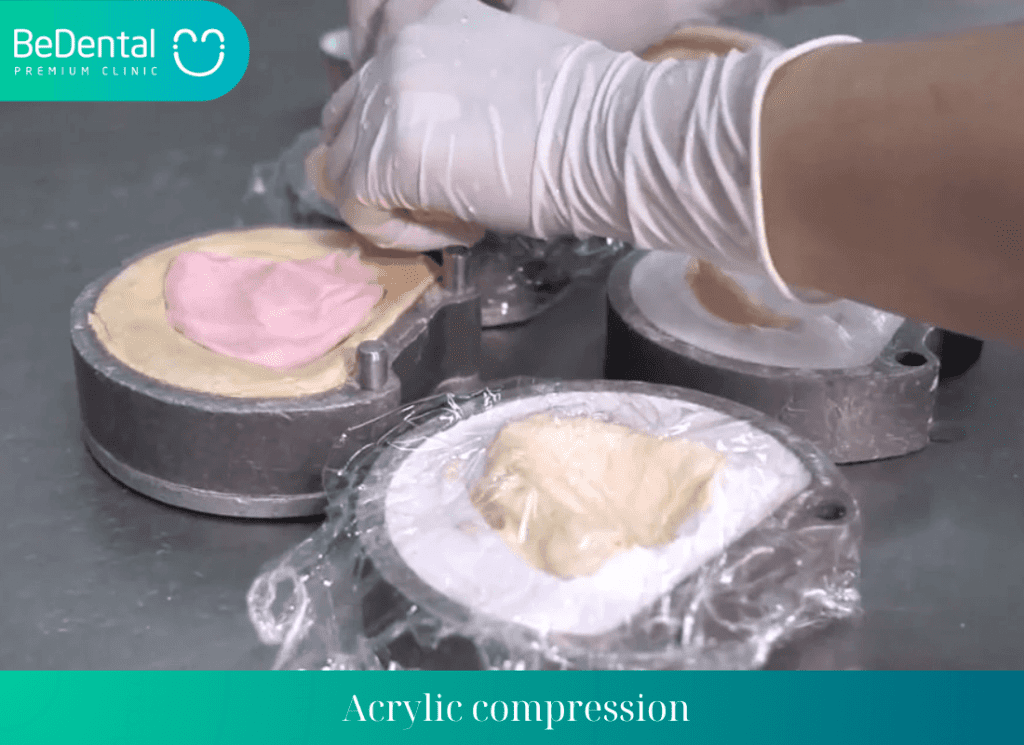
Step 9: Finishing
Each denture is meticulously finished by hand using special tools to remove any excess acrylic around the edges and palate area. The fit is checked, and adjustments are made if necessary.
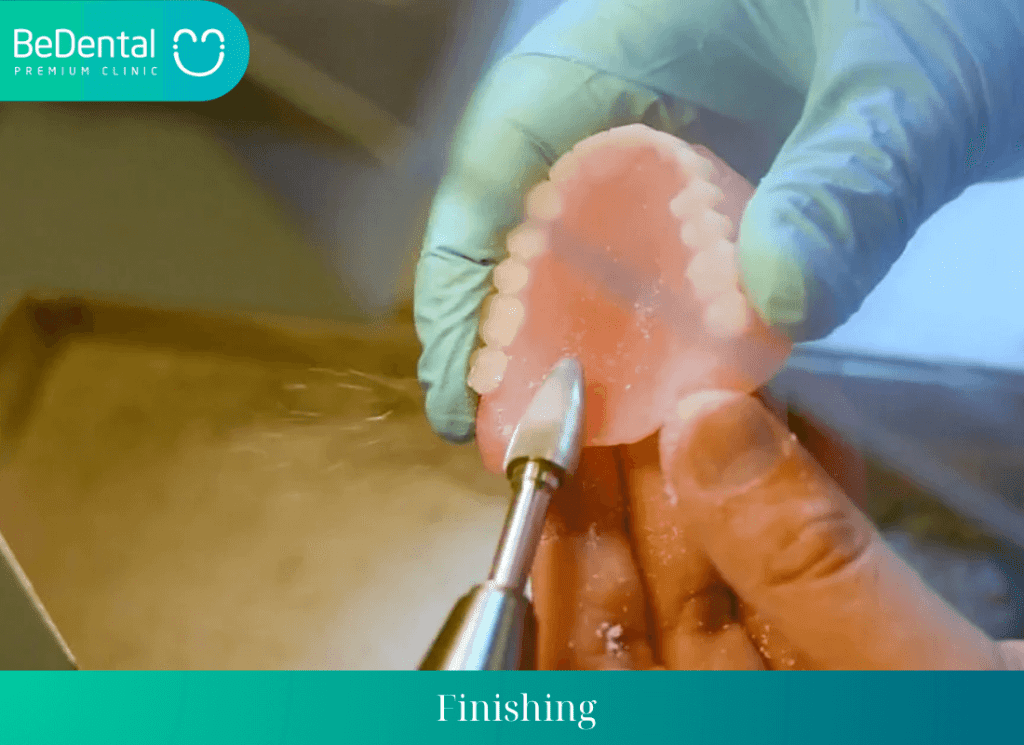
Step 10: Polishing
Finally, the denture is polished and smoothed using a polishing brush and pumice. This is done to create a natural shine.
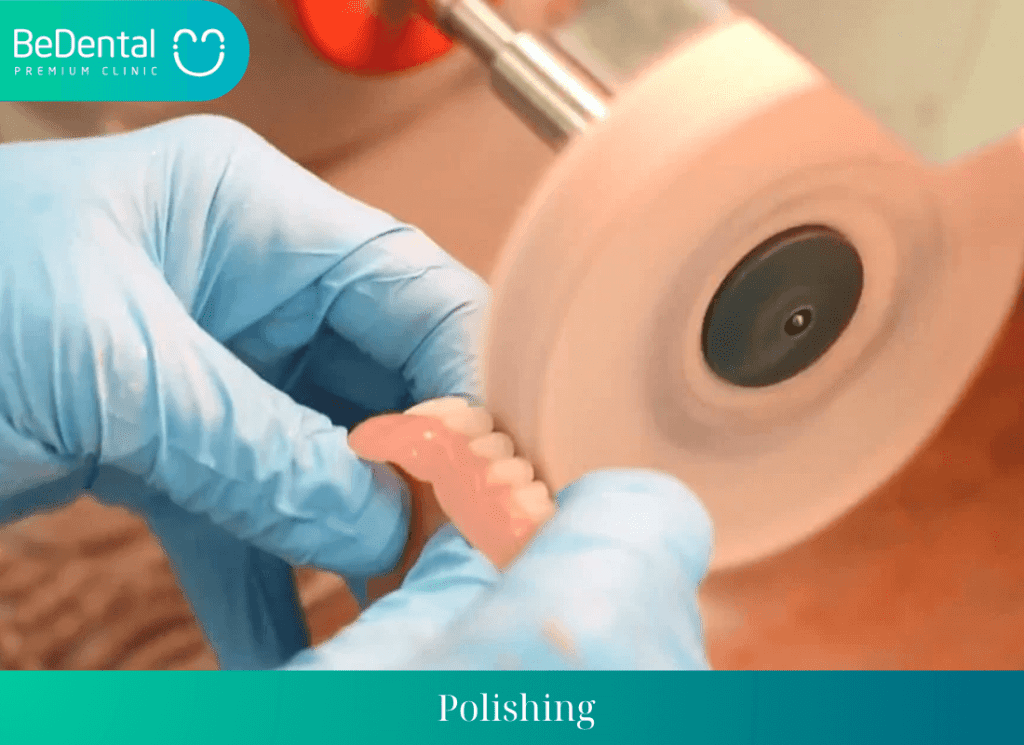
The denture fabrication process is generally carried out through these steps. Depending on the material used for the denture, the process may be more complex, but most of them undergo these basic steps.
Where to get reliable denture services?
Choosing a reputable dental clinic for denture services will greatly impact the outcome of your denture restoration. However, selecting a trustworthy dental clinic among thousands across the country is not an easy task.
Therefore, you can rely on the following criteria to choose a reputable denture clinic:
- Long-standing experience in dental care.
- Modern denture fabrication technology.
- Experienced and skilled team of dentists.
- Good quality denture materials with clear origin.
If you are looking for a reliable dental clinic for denture services in Hanoi and Ho Chi Minh City, you can consider using the services at BeDental.
BeDental is one of the leading dental clinics specializing in denture services, with a 5-star standard facility, advanced technology, and modern techniques. The team of dentists at BeDental are industry experts.
BeDental always prioritizes the customer experience with the aim of providing optimal support. At BeDental, there is a lifetime warranty when you use their services, and they offer reasonable installment support. When getting denture services at BeDental, you will go through the following process:
The denture fabrication process at BeDental:
Step 1: Examination and consultation of dental condition
First, the dentists at BeDental will perform X-rays to assess your dental condition. If you have any dental diseases, you will need to receive treatment before proceeding with denture services.
After the examination, the dental clinic will provide consultation and suggest suitable solutions for you.
Step 2: Oral hygiene
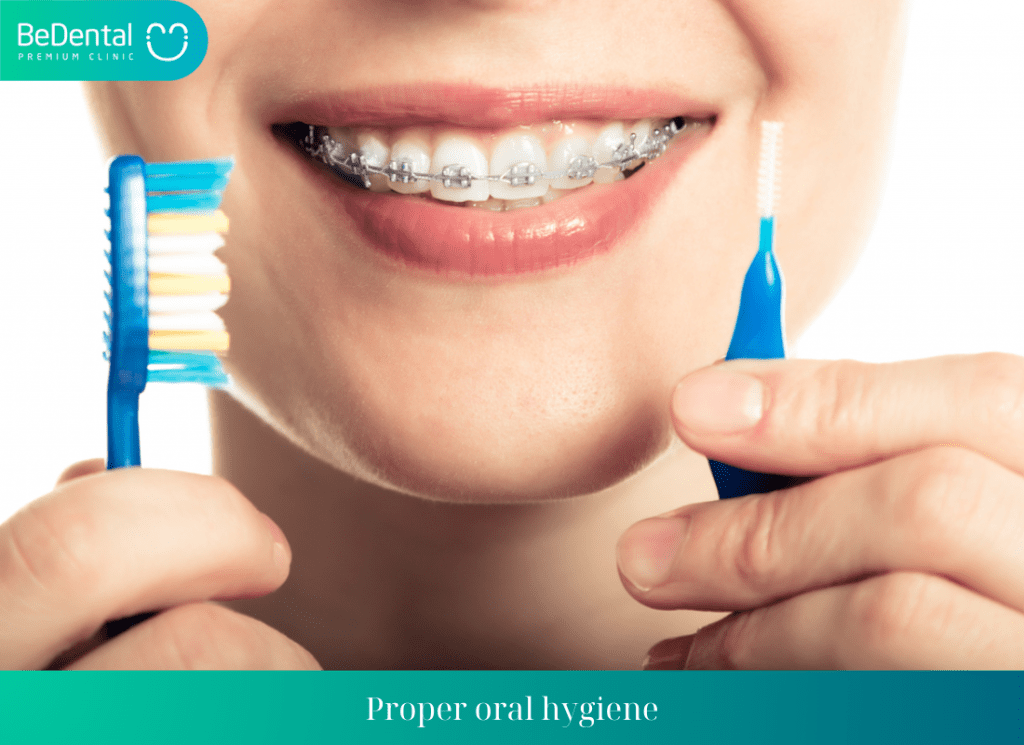
After agreeing on the denture restoration plan, the dental clinic will help you clean your mouth and perform disinfection to prepare for the next step.
Step 3: Denture impression and fabrication
After disinfection and oral hygiene, using professional techniques, the dentists at the dental clinic will take an impression of your teeth and fabricate a denture that fits you.
After that, you need to wait for 2 to 3 days for the denture to be completed. The dental clinic will then proceed to the next step.
Step 4: Denture placement
Once the denture is completed, the dental clinic will help you clean your mouth and place the denture. Then, the dentist will provide instructions on how to care for your denture.
Step 5: Regular check-ups
You need to visit the dental clinic for regular check-ups to detect any issues with the denture, such as looseness or damage, and have them promptly resolved.
How to care for removable dentures
To prolong the lifespan of your removable dentures, you should take note of the following:
- Regularly rinse your mouth after eating or drinking. This will remove any food debris and keep your mouth clean.
- Clean your mouth thoroughly when you remove your dentures. It is important to maintain good oral hygiene even when you are not wearing your dentures.
- Use a soft-bristled brush to clean your teeth, gums, and tongue, and use a denture brush or a soft, non-abrasive cloth like gauze to clean your denture base. This is an important step, even if you are not using denture adhesive.
- Brush your dentures gently. Your dentist will instruct you on how to clean your dentures when you receive them. You simply need to soak them and brush them gently with a non-abrasive denture cleaner.
- Soak your dentures overnight in a small glass or cup of cold water or denture cleaning solution. This ensures that your dentures do not dry out and lose their shape.
- Always clean your dentures thoroughly before putting them back in your mouth.
- Never use hot or boiling water on your dentures. It is unnecessary and can cause them to warp or distort. If you are concerned about using only cold water, you can use a denture soaking solution.
- Ensure that any products you use to clean or soak your dentures do not contain bleach, as it can discolor and damage them. You should also avoid using any chlorine-based products on the metal parts of your dentures, as this can cause corrosion.
- Whitening products do not have the same effect on dentures as they do on natural teeth. If you are unhappy with the color of your dentures, consult with your dentist.
- Gentle cleaning is key when cleaning dentures. Hard-bristled brushes and abrasive cleaners can cause damage, so always be careful when brushing your dentures.
- Don’t skip your dental appointments! Regular check-ups are still important for denture wearers as well as those with a complete set of natural teeth. Make sure you follow the recommended schedule set by your dentist.
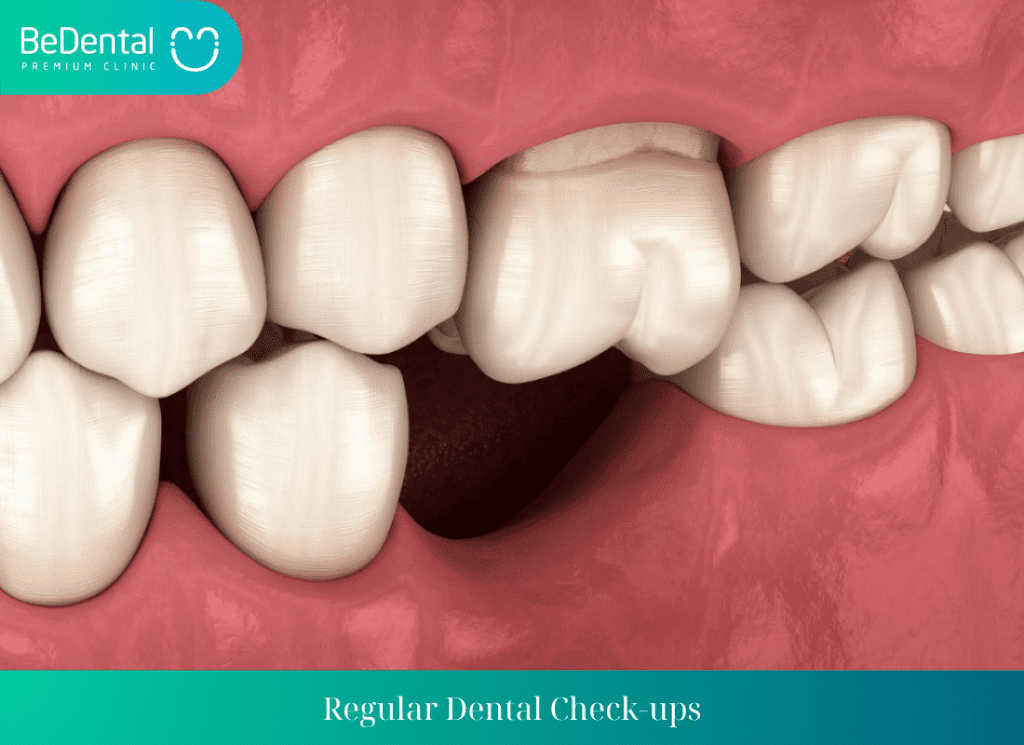
The above is the entire process of making removable dentures. BeDental hopes that this article can provide you with more information about the process of denture restoration, helping you choose a reputable dental clinic for denture services.
Apart from a reputable dental clinic, the material used for removable dentures also greatly affects the outcome of your denture restoration.
At first, you may feel uncomfortable with wearing removable dentures, but don’t worry, it will go away after a while. If you have any questions about the denture fabrication process, please contact BeDental for the fastest consultation and answers!
Price list for reference:
| List | Time | Unit | Price |
|---|---|---|---|
| 1.Removable Denture (More detail...) | |||
| Conventional Denture (More detail...) | 2 days | 1 jaw | 4.000.000 ~ 157$ |
| Flexible acrylic partial denture | 2 days | 1 jaw | 5.500.000 ~ 216$ |
| Cast metal partial denture | 2 days | 1 jaw | 4.500.000 ~ 177$ |
| Titanium partial denture | 2 days | 1 jaw | 6.000.000 ~ 236$ |
| 2. False teeth (More detail...) | 2 days | ||
| Acrylic resin teeth -made in Vietnam | 3 days | 1 unit | 350.000 ~ 14$ |
| Acrylic resin teeth -made in USA | 2 days | 1 unit | 600.000 ~ 24$ |
| Porcelain teeth backed with metal | 2 days | 1 unit | 1.800.000 ~ 71$ |
| Denture occlusion | 2 days | 1 unit | 1.000.000 ~ 39$ |
| 3. Non-removable denture : | |||
| Porcelain teeth backed with metal (More detail...) | |||
| Porcelain teeth backed with metal (Ni,Cr) | 3 days | 1 unit | 1.800.000 ~ 71$ |
| Porcelain teeth backed with metal Vivadent France (Cr,Co) | 3 days | 1 unit | 1.800.000 ~ 71$ |
| Porcelain teeth backed with metal Jelenko USD (Cr,Co) | 3 days | 1 unit | 2.000.000 ~ 79$ |
| Porcelain teeth backed with titanium | 3 days | 1 unit | 3.500.000 ~ 138$ |
| Non-metal Teeth : (More detail) | |||
| Porcelain Veneer Katana from Japan | 3 days | 1 unit | 3.500.000 ~ 138$ |
| Porcelain Veneer Venus from Germany ( (7 years Warantee) (Tìm hiểu thêm...) | 3 days | 1 unit | 4.000.000 ~ 157$ |
| Porcelain Veneer Roland from Germany ( 10 years Warantee) (More detail...) | 3 days | 1 unit | 4.800.000 ~ 189$ |
| Porcelain Veneer Roland HD from Germany (10 years warantee) (More detail...) | 3 days | 1 unit | 5.900.000 ~ 232$ |
| Porcelain Veneer Ceramil from Germany (10 years warantee)(More detail...) | 3 days | 1 unit | 6.000.000 ~ 236$ |
| Porcelain Crown Emax from Germany ( 15 years warantee) | 3 days | 1 unit | 7.000.000 ~ 275$ |
| Porcelain Veneer Htsmile from Germany(Bảo hành 15 năm) (More detail...) | 3 days | 1 unit | 7.000.000 ~ 275$ |
| Porcelain Veneer Emax press from Germany (15 years warantee) (More detail...) | 3 days | 1 unit | 9.000.000 ~ 354$ |
| Porcelain Veneer Cercon from Germany (15 years Warantee) (More detail...) | 3 days | 1 unit | 7.000.000 ~ 275$ |
| Porcelain Veneer Nacera from Germany ( 10 years warantee) | 3 days | 1 unit | 10.000.000 ~ 393$ |
| Porcelain Veneer Lava 3M Plus from USA ( 15 years warentee) (More detail...) | 3 days | 1 unit | 9.000.000 ~ 354$ |
| Porcelain Veneer 3M Lava Esthetic from USA (15 years warantee) | 3 days | 1 unit | 12.000.000 ~ 472$ |
| Porcelain Veneer Lisi from Japan (15 years warentee) (More detail...) | 3 days | 1 unit | 12.000.000 ~ 472$ |
| Porcelain Veneer Diamond from USA (lifetime warantee) | 3 days | 1 unit | 16.000.000 ~ 629$ |
Tư vấn chuyên môn bài viết:
BÁC SĨ DƯƠNG THỊ THÙY NGA
BEDENTAL - TOP STANDARD DENTISTRY SYSTEM
In HANOI
Address 1: 7B Thi Sach St, Ngo Thi Nham, Hai Ba Trung Dist, Ha Noi. - 0934.61.9090
Address 2: No 129 Hoang Ngan, Yen Hoa, Cau Giay Dist, Ha Noi. - 0934.61.9090
In HO CHI MINH
Address 1: 53 -55 -57 Pho Duc Chinh St, Nguyen Thai Binh, Dist. 1, Ho Chi Minh. - 0766.00.8080
Working: 9am - 8pm everyday
Website: https://bedental.vn/en/
PLEASE LEAVE YOUR INFORMATION IF YOU WANT DENTAL CONSULTATION






Pingback: Can I take Panadol for toothache? Some ways to relieve toothache at home – Be Dental